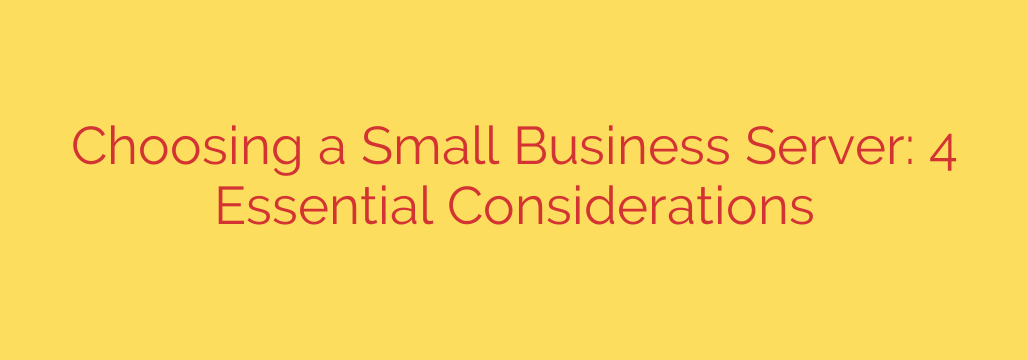
Choosing the right server is a crucial decision for any growing small business. Your server handles vital tasks like storing data, managing email, running applications, and supporting your network. A poorly chosen server can lead to frustrating slowdowns, security risks, and unnecessary costs. To make the best choice for your company’s future, here are four essential considerations.
First, evaluate your current and future needs. What applications will the server run? How many users will access it? What are your storage requirements now, and how fast do you expect them to grow? Understanding your workload (data processing, file sharing, email hosting, specific software like CRM or accounting) is fundamental. Don’t just think about today; consider your business plan for the next 3-5 years. This foresight helps prevent needing an expensive upgrade or replacement too soon. Accurate assessment of your performance needs is key to avoiding bottlenecks that hurt productivity.
Second, consider the cost. This isn’t just the purchase price of hardware or the monthly fee for a cloud service. Factor in ongoing costs like power consumption, cooling, maintenance, software licensing, and potential repairs. For on-premise servers, you’ll have significant upfront hardware costs plus recurring expenses for power and maintenance. For cloud servers (like those offered by AWS, Azure, or Google Cloud), the costs are typically subscription-based, varying with usage. Compare the total cost of ownership over several years for different options. Remember to factor in the cost of IT support, whether internal or external.
Third, think about scalability. As your business grows, your server needs will likely increase. How easily can your chosen solution adapt? An on-premise server might allow for adding more storage or RAM, but significant expansion often requires purchasing new hardware. A cloud server generally offers much greater flexibility; you can often scale resources like processing power, storage, and user licenses up or down relatively easily and quickly based on demand. Choose a solution that can efficiently grow with your business without disrupting operations.
Finally, consider management and support. Who will manage the server? Do you have in-house IT expertise, or will you rely on external IT support? An on-premise server requires regular maintenance, security patching, backups, and troubleshooting by knowledgeable staff. This can be a significant burden without dedicated IT personnel. A cloud server typically shifts much of the hardware maintenance, security updates, and infrastructure management responsibility to the cloud provider. This can significantly reduce the IT workload for a small business, allowing staff to focus on core business activities. Also, evaluate the available support from the vendor or provider – what happens if something goes wrong? Reliable support is essential for minimizing downtime.
Choosing the right server impacts your business’s efficiency, security, and budget. By carefully evaluating your needs, understanding costs, planning for scalability, and considering management requirements, you can select a server solution that provides a solid foundation for your business’s success.
Source: https://kifarunix.com/consider-these-4-things-in-choosing-a-server-for-your-small-business/








